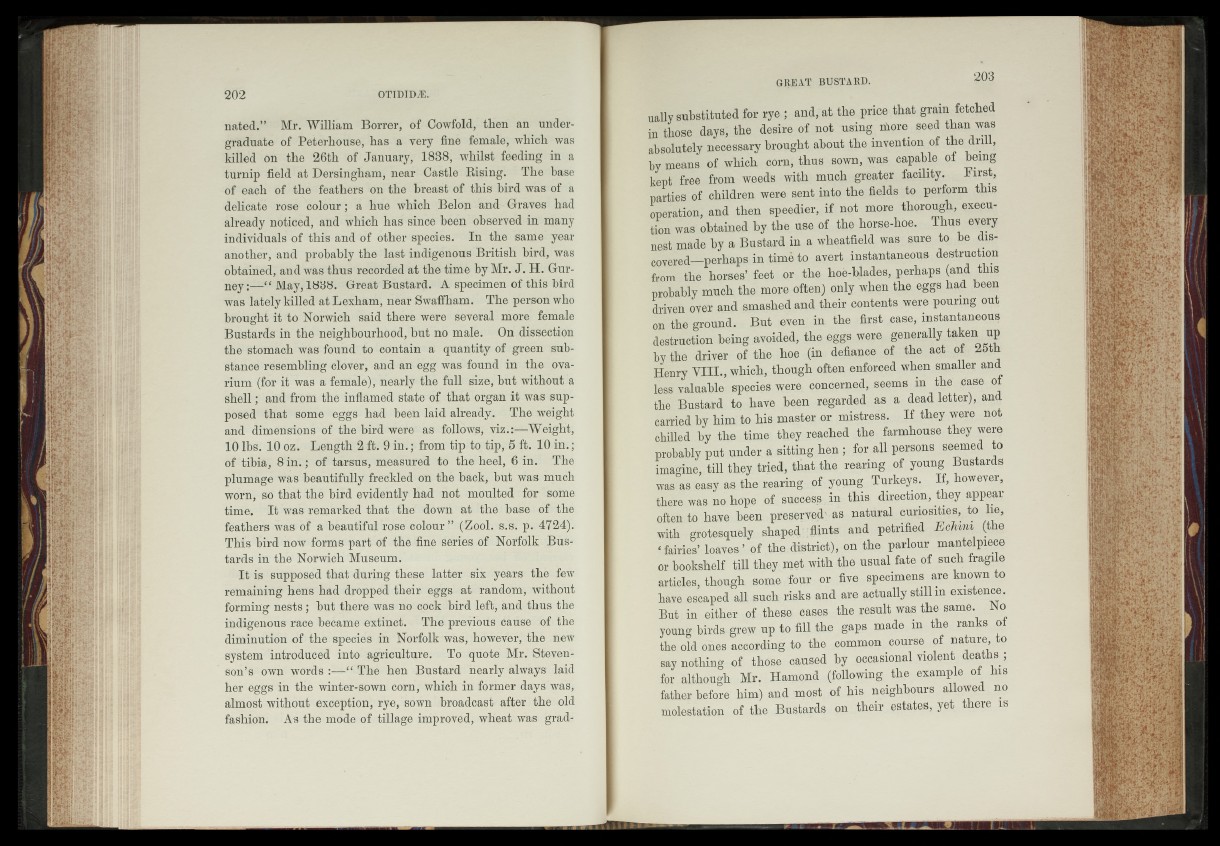
nated.” Mr. William Borrer, of Cowfold, then an undergraduate
of Peterhoiïse, has a very fine female, which1 was
killed on the 26th of January, 1838, whilst feeding in a
turnip field at Dersingham, near Castle Rising. The base
of each of the feathers on the breast of this bird was of a
delicate rose colour; a hue which Belon and ©rates had
already noticed, and which has since been observed in many
individuals of this and of other species. In the same year
another, and probably the last indigenous British bird, was
obtained, and was thus recorded at the time by Mr. J . H. Gurney*^
May, 1838. Great Bustard. As specimen of this bird
was lately killed at Lexham, near Swaffham. The person who
brought it to Norwich said there were several more female
Bustards in the neighbourhood, but no male. On dissection
the stomach was found to contain a quantity of green substance
resembling clover, ahd an egg was“ found in the Ovarium
(for it was a female), nearly the full size/but without a
shell ; and from the inflamed state'/öf that organ it was supposed
that some eggs had been laid already,." The'aveight
and dimensions of the bird-were’ as follows, viz. ^We ight,
10 lbs. 10 oz. Length 2 ft. 9 in. ; from tip ta tip, 5 ft. lO-in. ;
of tibia, 8 in. ; of tarsus, measured to the heel, 6 in. The
plumage was beautifully freekled on-thè back, but was much
worn, so that thé bird evidently*had not-moulted for "some
time. It waS remarked that the down atr-lthe base of the
feathers was of a beautiful roWeolour P:'(Zool. s»s. p.,4724).
This bird how forms'part of the/fine .series Of Norfolk..Bus-
tards in’ the Norwich Museum."
It is supposed that during these latter six/years the few
remaining hens had dropped their, eggs at--random* witHdöt
forming nests ; but there was no cock bird left^and thus the
indigenous race became extinct.. -The previous cause -fofithe
diminution of the species in Norfolk was, 'hÔWe^ér, the aasem
system introduced into agricult ure? , /To:- quote Mr. Steven-
soh’S^ own words The hen-Bustard dearly always laid
her eggs 'in thè winter-sown corn/ which in former days was,
almost without exception; rye, sown' broadcast-after the -.old
fashion. ' .‘As theimbde of .tillage improved^ wheat was - gradually
substituted for rye ; and, at the price , that gram fetched
in those days, the desire of not using more seed than was
absolutely necessary brought about tpe invention of the drill,
by means of which com, thus sown, was capable of being
kept free from weeds with much greater facility. First,
parties of children were sent;intq the fields to perform this
operation, and then speedier, if not more.‘thorough, execution
was obtained by the use of-the.horse-hoe.. Thus every
nest made by ar Bustard in M B « was sure to be discovered—
perhaps in time to ayerfjnstantaneous destruction
from the horses’ feei/pr, th\ hoe-blades, perhaps (and this
probably much the more often) only when-the eggs had beep
driven over and smashed and their contents were pouring out
on the ground, fiat even | | the ftrst .case, instantaneous
destruction being avoided, the eggs were, generally taken up
by the driver of the hoe (dm defiance of the act-op. 25th
Henry VIII., wh\ch, though often enforced when smaller and
less valuable species were concerned, seems in the ;case.of
the Bustard to have been regarded as a dead letter), and
carried by him, to his master or mistress. If they .were not
chilled Jry 4 he .time they reached the farmhouse, they were
probably,put-under a sitting hen « B l f B B H
imagine, till they tried, that. the. rearing of; young Bustards
was as easy as the; rearing of .ypHS.gi^^key% If, however,
there was no hope of. success, 1% this direction, tpey appear
often to have /hepn preserved'1 as natural
with grotesquely shaped; Bints and petrified ( e
‘ fa irie s ’ lo av es# ^ eB iB trict)von the parlour mant#pi
or bookshelf till they met with the usual fate of such, fragile
articles, though B H i fspecirneps, are known tp
have escaped all such-risks and are actually: still m existeggb
But in- either of .these cases the result was the sameg|po
young bMs,grew up to/fill the gaps made in the ranks ot
the old ones accofding to 'the common, coursq, of n a tu r e ^
say nothing, of, . j£#<^caused by occasional y i p » dfW si
for although Mr. Hamond (following the-qxample ol tg8
father before him) and most, of his neighbours • allowed WR
molestation of the Bustards on .their estates, ye.t there is